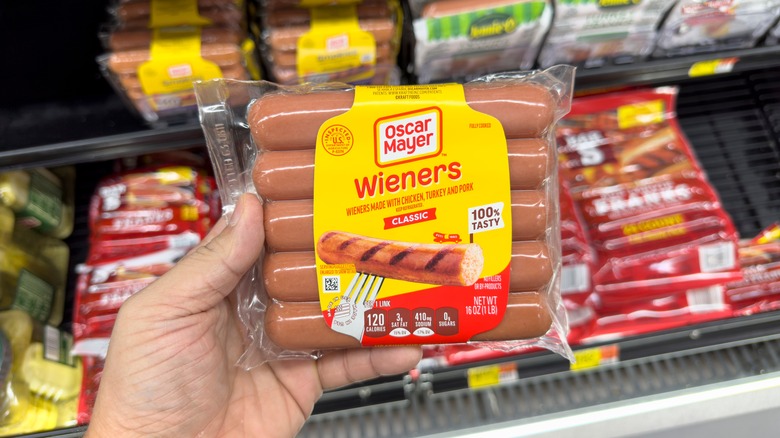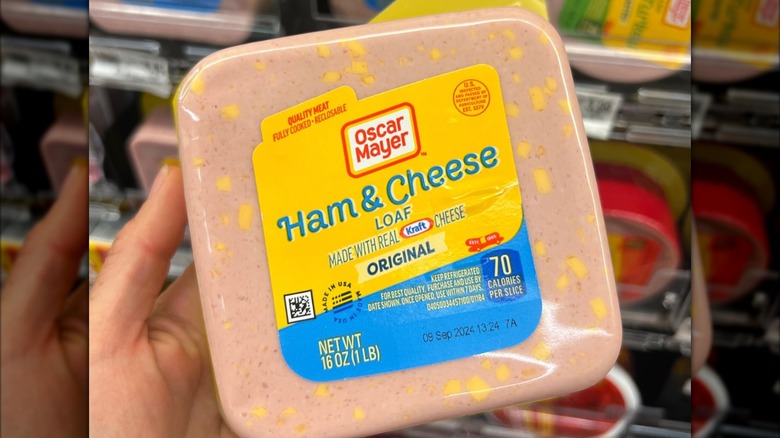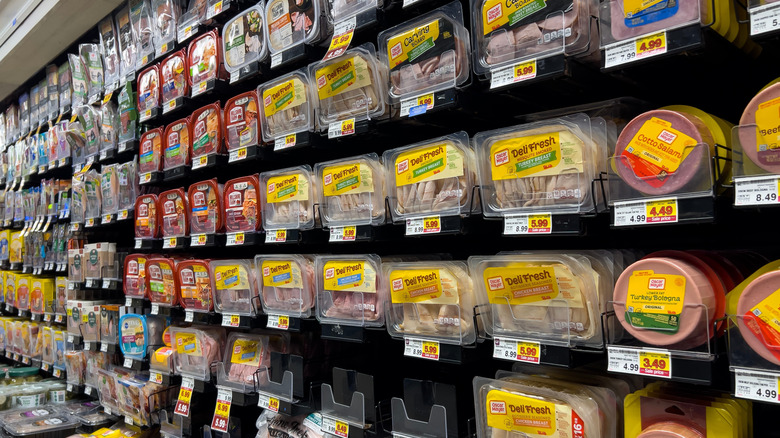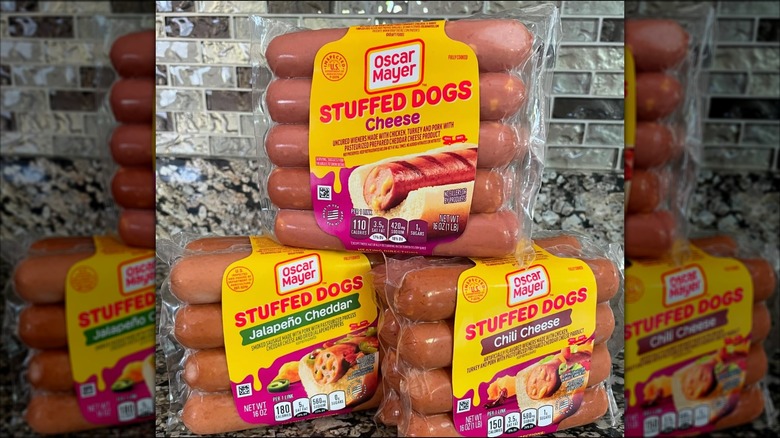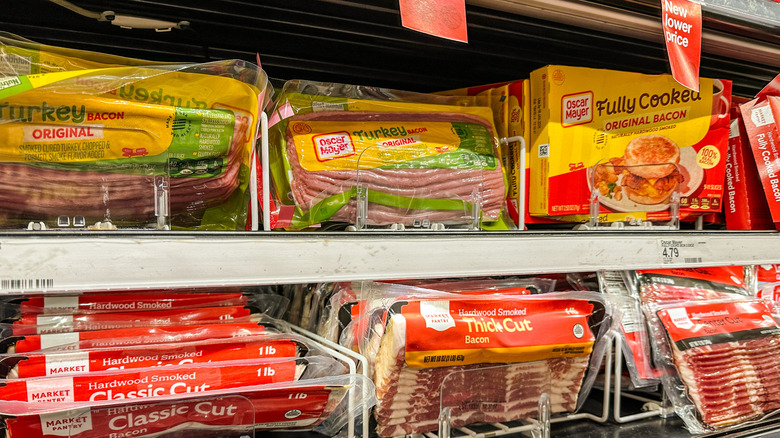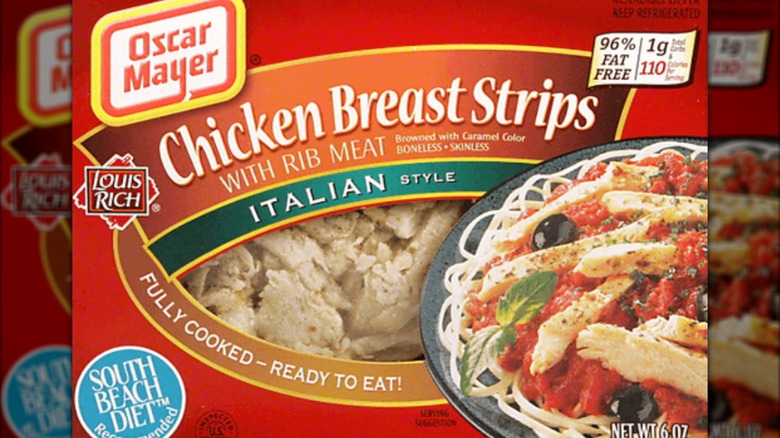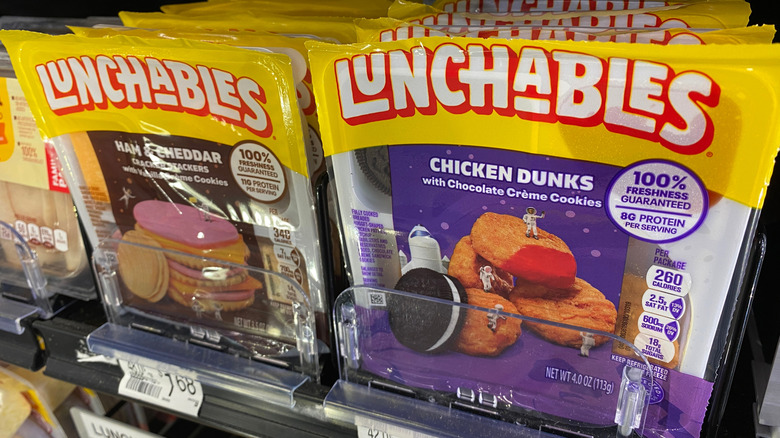6 Recalls That Will Always Haunt Oscar Mayer
"Oh, I wish I were an Oscar Mayer wiener... everyone would be in love with me!" With earworm jingles like this one along with iconic imagery and marketing, Oscar Mayer has cemented itself as a leading pre-packaged meat brand. There's no mistaking the yellow band wrapped around packages of the company's hot dogs, and you've surely seen its other meat products like sliced ham or turkey throughout grocery stores nationwide. But there are some things you may not know about Oscar Mayer, from what's really inside of its meat products to how the brand has had its fair share of recalls that continue to haunt its legacy.
Some infamous Oscar Mayer recalls have come about due to nationwide outbreaks that had widespread effects across many food brands. But for other recalls, the company was directly responsible for the mishap. From blatant mistakes like mislabeling of products to unsanitary food preparation conditions, some of these recalls could've been avoided. Furthermore, the recalls span across a wide range of Oscar Mayer's popular products, from its classic wieners to sliced turkey bacon to pre-cooked chicken breast. Read on to see why customers surely won't forget these Oscar Mayer recalls.
1. Ham & Cheese Loaf was recalled due to possible cross-contamination
In 2022, Oscar Mayer issued a recall of 2,400 pounds of Ham & Cheese Loaf due to a possible cross-contamination scare. The Ham & Cheese Loaf combines sliced ham with Kraft cheese, creating a ham product that offers a bits of cheese in every bite. However, the meat used in this product was found to have been cut on contaminated slicing equipment.
Apparently, the equipment had not been properly sanitized after slicing a separate under-processed product (under-processed meaning not fully cooked). This caused possible cross-contamination to the fully cooked Ham & Cheese Loaf product. As a result, 2,400 pounds of 16-ounce Ham & Cheese Loaf had to be recalled post shipment and distribution to retailers. Luckily, no consumers had reported falling ill after eating the product, but the FSIS (Food Safety and Inspection Service) branch of the USDA warned consumers to remove this product from their refrigerators and freezers at the time of the recall.
2. Listeria scare causes recall of brand sliced meat product
From the end of 1998 to the beginning of 1999, the nation experienced a listeria outbreak that spanned over 11 states and affected multiple companies. Some brand meat manufacturers issuing recalls for deli meat and hot dog products at this time were Bil Mar, Sara Lee, and Ball Park.And unfortunately, Oscar Mayer was impacted by this outbreak as well with a listeria scare occurring around the end of January 1999. Oscar Mayer was alerted of the contaminated product after a consumer in Kansas City, Missouri, became ill and tested positive for listeria.
The recall affected a few of Oscar Mayer's products, including the 10-ounce All American Variety Pack and 9-ounce Club Sandwich Variety Pack. In total, more than 28,000 pounds of the product were recalled. Luckily, there were no further serious illness or any deaths reported in relation to the products. But outside of Oscar Mayer's food items, the aforementioned nationwide listeria outbreak did result in the death of six adults. In this case, Oscar Mayer's quick action spared them any consumer deaths on their conscience.
3. A mislabeling incident led to recall of 96,000 pounds of stuffed hot dogs
In 2014, 96,000 pounds of Oscar Mayer's classic wiener product had to be recalled after meat-only wiener packages contained the brand's classic stuffed cheese dog wieners instead. Milk is a well-known allergen, one that requires proper indication by any food manufacturer to warn customers. Unfortunately, due to this labelling mix-up, Oscar Mayer misled customers to unknowingly purchase the cheese dog product. The affected products included both the Classic Cheese Dogs Made with Turkey & Chicken, and Classic Wieners Made with Turkey & Chicken that were made in early March 2014 in a facility in Columbia, Missouri.
The USDA indicated the Oscar Mayer classic wiener/cheese-stuffed wiener recall as a Class I Recall, the most severe recall classification. The USDA identifies a Class I Recall as one that "involves a health hazard situation where there is a reasonable probability that use of the product will cause serious, adverse health consequences or death." The recall occurred after a customer made a complaint to Kraft (parent company of Oscar Mayer), but the USDA and FSIS luckily received no reports of serious illnesses or deaths regarding this recall. 10 years after this recall, the product is still available and Oscar Mayer has even launched a new line of stuffed dogs – and it seems like this time they're labelled correctly.
4. Quick spoilage of turkey bacon resulted in a massive recall
Oscar Mayer brand turkey bacon already ranks low when compared to other brands, but it was also the star of one of Oscar Mayer's largest recalls. In 2015, 2 million pounds of turkey bacon product was pulled from shelves, with Oscar Mayer citing their use-by dates as incorrect and warning the product might spoil quicker than anticipated. The company was made aware of the issue after numerous consumers called in with reports of early product spoilage. The USDA ultimately labelled this recall as a Class II, which it defines as a "remote probability of adverse health consequences from the use of the product." Unfortunately, that remote probability came to fruition as multiple consumers reported becoming ill after consuming the product.
This recall applied to turkey bacon products made from the end of May to the beginning of August of 2015 that had already been shipped nationwide as well as to parts of the Caribbean.
5. Oscar Mayer issued a second listeria contamination recall, this time for chicken breast products
In 2007, a second massive recall hit Oscar Mayer due to another listeria contamination. An inspection of one single package of pre-cooked Oscar Mayer/Louis Rich chicken breast strips resulted in a wide-reaching recall. At first, Oscar Mayer contractor Carolina Culinary Foods found traces of listeria in only one package of product. But eventually, after further testing, Kraft decided to expand the recall to include over 2.8 million pounds of chicken breast strip and cutlet product made at the same facility as the original contaminated product.
Once again, the product had already been shipped nationwide, with the recall applying to chicken breast products with a use by date earlier than May 28, 2007. This included multiple different sizes and flavors of the Oscar Mayer/Louis Rich chicken breast product, such as Grilled, Southwestern Seasoned, Italian Style, Honey Roasted and Oven Roasted. But luckily in this case, the FSIS received no reports of consumer illness.
6. Lunchables recalled and banned from school lunches due to lead and high sodium
In late 2024, a petition launched by a Consumer Reports investigation proved successful when Kraft Heinz (the parent company of Oscar Mayer) made the decision to pull its Lunchables products from the National School Lunch Program. To help fit the National School Lunch Program's nutrition standards, Kraft Heinz had initially redesigned two of its Lunchables products — the Extra Cheesy Pizza and Turkey and Cheddar Cracker Stackers — for release in schools. These products would go to students enrolled in the free and reduced lunch programs. But clearly, those standards were not high enough, as Consumer Reports found through its investigation and testing not only extremely high levels of sodium, but also traces of dangerous lead and phthalates in the supermarket counterparts of those products.
The original Consumer Reports petition asked the USDA to not only remove Lunchables from school lunches, but to also raise the standards for healthy options available to kids in schools. Although the pull of the product came during the months following the investigation, Kraft Heinz claims the investigation did not influence its decision to remove the product from schools. And while the product is no longer available through the National School Lunch Program, the company still sells Lunchables in grocery stores nationwide despite the concerning findings of the Consumer Reports investigation.
